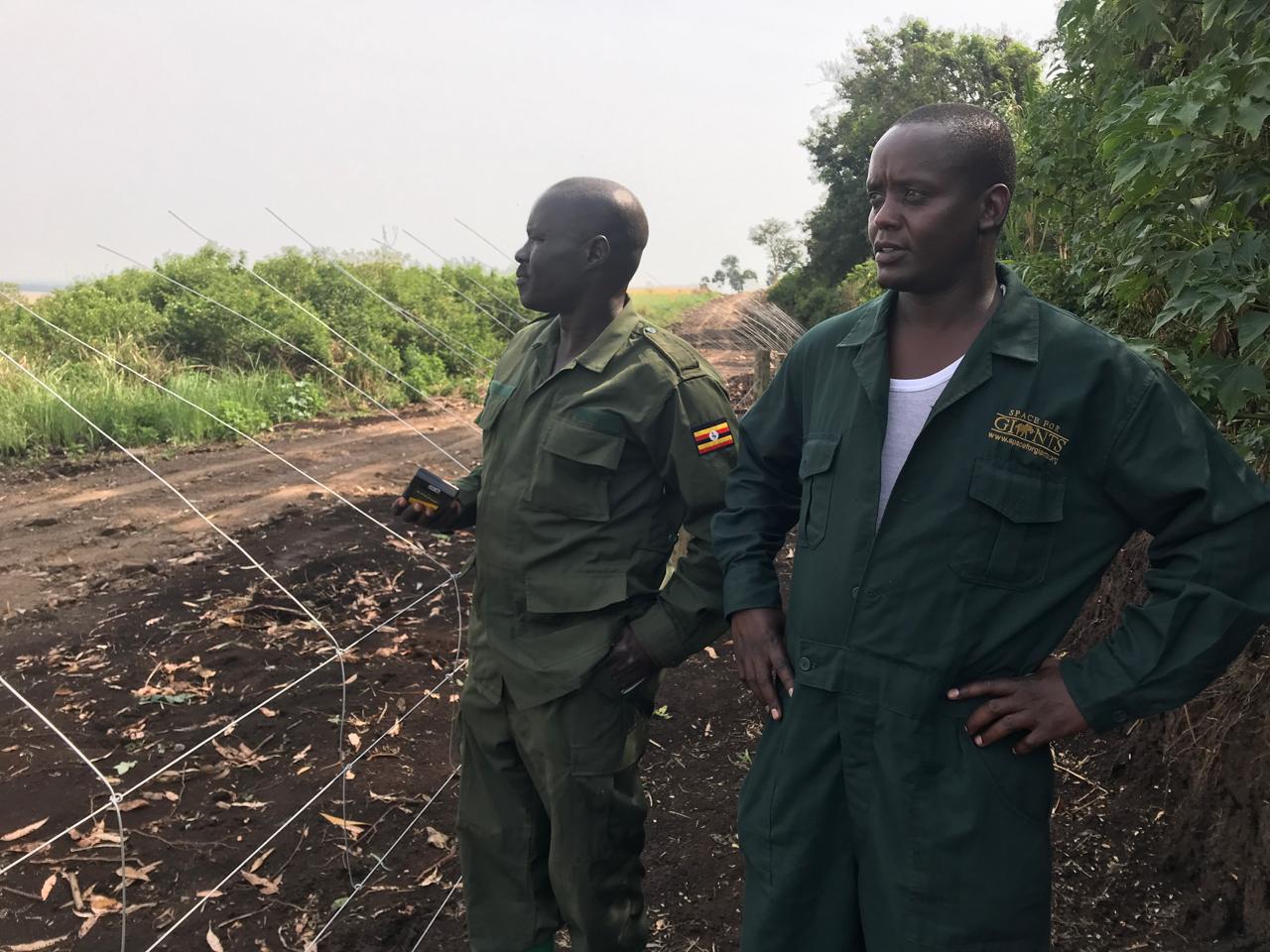First electric fence at Ugandan national park to mitigate human-elephant conflict
Elephants repeatedly break into farmers fields near Uganda's Queen Elizabeth National Park, destroying harvests and livelihoods

By Pamela Amia for Chimpreports.com in Uganda
Human-wildlife conflict remains a big threat to conservation, especially in the areas surrounding Uganda’s national parks. It is not different for people from Kafuro village who have had to put up with the dangerous interaction with the wild animals from Queen Elizabeth National Park for many years.
This is mainly because people here have slowly extended their cultivating land into the territories of the wild animals. As a result, elephants and buffalos often cross from the park to the farmland and destroy people’s crops.
People try to keep away elephants by sleeping in small grass-thatched huts to guard their farms.When the elephants persist, they bang pans and light fires to scare them off. If this doesn’t work, the people organise to injure or kill the animals. This sometimes is catastrophic because people or animals or both end up dead.
Two weeks ago, international conservation charity Space for Giants, conducted a training and also took reporters for a field trip to Queen Elizabeth to see first-hand what they are doing to reduce human-wildlife conflict and also to assess the impact of the raids from the natives living around the park.
As a remedy, Space for Giants is constructing an electric fence that costs up to £5,000 per kilometre on the Eastern Boundary of Queen Elizabeth National Park from Kyenzaza to Kyabakara, which is 10 kilometres.
From there, the Uganda Wildlife Authority is expected to take over and extend the fence 15km to 20km where the Human Elephant Conflict is worse.
According to Edward Asalu, the Chief Warden at Queen Elizabeth National Park, the fence is the first of its kind in Uganda. “Constructing the fence is a very important step in solving the human-wildlife conflict as it will help stop the wild animals from leaving their natural habitats and protect people’s farms,” Asalu said.
We caught up with Ibrahim Njenga, the Space for Giants Senior Technician at the site where the fence is being constructed. Njenga says construction started in October 2018 at Kyambura because it had the highest rate of Human-wildlife conflict. So far, they have constructed 5km and expect to complete the work in the next three months.
“Wires are strung horizontally between 3ft posts, pulsing with up to 9,000 volts of electricity drawn from solar-powered energisers. Protruding from the horizontal wires are 4ft electrifies outriggers that rise at an angle of 45 degrees towards the direction the animal will approach from the park side,” Njenga said.
The idea is that when the wires touch an elephant on their soft flesh of its chest or its trunk, delivering a shock, it turns and returns to the Park.
“Elephants are quick learners and can know how to put down a tall fence or one without outriggers and that’s the major reason why we choose to use this kind of fence. The good news is that the electric fence cannot kill people and animals; it just makes them very uncomfortable.”
Njenga says he has seen elsewhere that some people living near such fences, break them in order to continue illegally entering conservation areas to collect firewood or water or poach animals.
“This renders the fence ineffective and elephants learn fast where fences are no longer electrified, and take advantage. There must be a strong local appreciation of the benefits the fence brings.”
“Some animals with horns, for example, buffalo or antelope, may get tangled in the fence and if they are unable to break free they may be electrocuted. This is extremely rare. The community must keep its livestock clear of the fence,” he noted.
Forty-five-year-old Yakobo Yabwe who is a resident at Kafuro told us that this fence will help them begin spending nights at home with their children instead of camping all night to fight the wild animals.
“At the moment l camp near the park so that l can watch over my garden and try to stop animals when they attack us. In fact, yesterday night they came and destroyed our crops. A few months ago a buffalo killed one of our own. He was an elder in the village called Angelo Ndyoburungi. He was trying to chase the wild animals away from his farm when he lost his life,” Yabwe said.
He added, “The Construction of the electric fence is a blessing since some of us are being employed and trained to do the work hence earning an income which helps us sustain our family’s livelihood”.

This article is reproduced here as part of the Giants Club African Conservation Journalism Fellowships, a programme of the charity Space for Giants and supported by the owner of ESI Media, which includes independent.co.uk. It aims to expand the reach of conservation and environmental journalism in Africa, and bring more African voices into the international conservation debate. Read the original story here.

Join our commenting forum
Join thought-provoking conversations, follow other Independent readers and see their replies